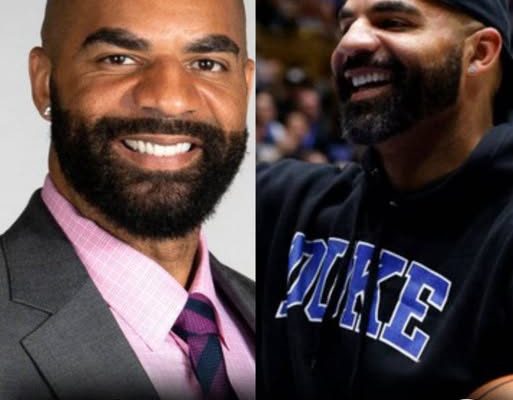In a groundbreaking move that merges basketball excellence with athletic innovation, former NBA All-Star Carlos Boozer has been named the inaugural “Director of Player Physical Development.” This newly created role reflects the evolving demands of modern basketball and the need for organizations to prioritize not only player performance on the court but also long-term physical durability, personal wellness, and holistic athletic growth. Boozer’s appointment is both a nostalgic nod to his decorated playing career and a forward-looking strategic decision that could reshape how franchises, schools, and training programs approach player development in the 21st century.
Carlos Boozer, known for his powerful post play, rebounding prowess, and undeniable work ethic, brings with him a wealth of experience from an NBA career that spanned over a decade. Having played for franchises like the Cleveland Cavaliers, Utah Jazz, Chicago Bulls, and Los Angeles Lakers, Boozer was known not just for his physicality but for his meticulous training regimen and deep understanding of the physical demands of elite basketball. During his time in the league, Boozer was recognized for maintaining peak conditioning and for his ability to stay productive well into his thirties—a feat that many modern players strive to achieve in today’s fast-paced, injury-prone environment.
The creation of the “Director of Player Physical Development” role signals a critical shift in how athletic departments and professional teams intend to invest in the long-term health and peak performance of their players. No longer is strength and conditioning considered a backroom aspect of athletic success—it has taken center stage. Boozer’s unique blend of experience, leadership, and relatability to current athletes positions him perfectly to lead this initiative. He will be responsible for crafting and overseeing individualized development programs, integrating cutting-edge sports science with proven old-school training techniques, and fostering a culture where physical preparation becomes as respected as basketball IQ and film study.
Boozer’s influence in this role will go far beyond what fans see during game time. He is expected to work hands-on with athletes during the offseason, in-season, and during recovery phases—tracking biometrics, managing load distribution, and personalizing regimens that balance explosiveness with injury prevention. In an era where torn ligaments, stress fractures, and soft tissue injuries have derailed countless careers, the presence of a trusted veteran like Boozer guiding physical development is a move rooted in both logic and foresight. Moreover, Boozer’s involvement gives younger athletes direct access to a player who has not only succeeded at every level but who has also overcome the physical wear and tear that comes with competing at the highest level for over a decade.
What sets Boozer apart from many former players turned development experts is his analytical approach to physical training. During his playing days, he was known to study biomechanics, muscle recovery patterns, and post-game performance analytics—long before those topics became industry buzzwords. He was often spotted engaging with trainers and sports scientists during his time with the Chicago Bulls, a period when the NBA began its shift toward embracing advanced sports medicine. That curiosity, combined with lived experience, allows Boozer to connect the dots between theory and practice in ways that few others can.
Perhaps just as important as his technical knowledge is Boozer’s presence and leadership. Young athletes today are bombarded with conflicting advice from social media trainers, outdated coaching norms, and commercialized workout plans. Boozer represents an authentic, proven voice. His ability to bridge generational gaps, coupled with his calm demeanor and relentless drive, makes him not just a mentor but a model. Athletes under his tutelage can look to him not only for squat form or recovery advice but for guidance on how to craft a professional identity built on resilience, professionalism, and sustained discipline.
In a press statement following the announcement, Boozer shared his enthusiasm for the role. “Physical development is everything. You can’t perform, can’t compete, can’t even train properly if your body isn’t right. I’ve lived that life, and I’ve learned from some of the best trainers and coaches in the world. I’m here now to pass on that knowledge and help this next generation take it even further. It’s about longevity, sustainability, and building habits that produce greatness year after year.”
That commitment to long-term health is expected to be one of the central pillars of Boozer’s strategy. Rather than pushing athletes to achieve short-term gains or peak during specific parts of the season, Boozer intends to implement a 12-month cycle approach that includes strength progression, cardiovascular sustainability, joint preservation, and neurological rest. He has already hinted at partnerships with sports performance labs, wearable tech companies, and mobility-focused programs to ensure that his athletes are not only strong but adaptable.
From a basketball standpoint, the hire is also likely to have a tactical ripple effect. A player like Boozer, who thrived through smart positioning, efficient post play, and relentless effort, is poised to instill those values into the physical routines he oversees. His emphasis on footwork, core strength, and lower body balance could elevate how players think about their bodies in relation to the game—not just in terms of looking good physically, but performing well fundamentally. His experience guarding elite big men and contending with injuries of his own lends added credibility to any advice he offers in the realm of recovery and reconditioning.
The respect that Boozer commands in basketball circles is another important asset. Players listen to those who have walked the walk. Boozer’s relationships with current and former NBA players, trainers, and coaches mean that his impact in this role will be far-reaching. Already, several professional athletes and college stars have voiced their support on social media, applauding the appointment as a win not just for the organization he’s joining but for the broader basketball community. In many ways, Boozer represents the ideal blend of yesterday’s grit and today’s precision.
The timing of Boozer’s appointment couldn’t be more fitting. As basketball continues to evolve—where positional fluidity, increased pace, and enhanced athleticism put new strains on the body—organizations are racing to stay ahead of the curve. Traditional weightlifting programs and generic conditioning regimens no longer suffice. The era of personalized, data-driven, player-centered development is here, and Boozer is stepping into this new frontier with the same intensity that defined his playing days.
Moreover, the role has the potential to become a standard in both collegiate and professional sports, paving the way for other former players to take on similar positions. Just as teams now have shooting coaches, nutritionists, mental skills experts, and video analysts, the need for a specialized voice in physical development is long overdue. Boozer’s pioneering involvement sets the tone. He isn’t just filling a position—he’s defining it. What he does in this role may very well become the blueprint for how elite athletes are developed over the next decade.
In a recent interview, Boozer emphasized that his mission goes beyond performance metrics. “This is about helping athletes become their best selves physically and mentally. When your body is right, your mind follows. And when you know how to take care of your body, you don’t just extend your career—you elevate it. That’s what I’m here for.”
There’s a clear emotional undercurrent to Boozer’s return to an official basketball role. For a player whose toughness, resilience, and effort made him beloved by fans across the league, this is not just a professional endeavor—it’s a legacy move. Boozer has never shied away from hard work, and now, he’s ready to help the next generation do the same. The title might read “Director of Player Physical Development,” but in truth, Boozer’s influence will extend far beyond the weight room. He’s a connector, a mentor, and a transformational figure stepping into an era that desperately needs his blend of experience and innovation.
As this new chapter unfolds, all eyes will be on how Boozer’s approach reshapes the physical narrative of elite basketball development. If his playing career is any indication, he will do it with professionalism, passion, and power—and the results may very well redefine what it means to prepare an athlete for greatness.



